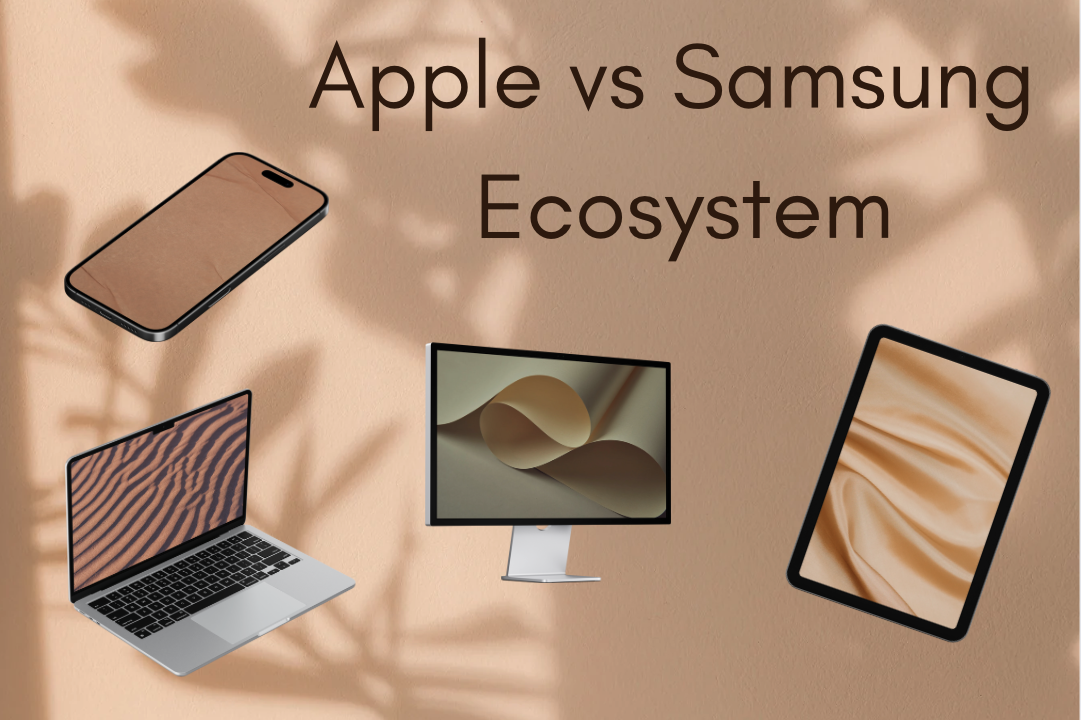Apple vs Samsung’s Ecosystem: Which is better ?
Apple and Samsung have built powerful ecosystems designed to connect brand devices and bring more to the experience. Each brand offers their own unique approach, with strengths and weaknesses. Lets dive into two, well known competitors and see how they compare:
Apple’s Ecosystem
Devices within the Apple Ecosystem: • iPhone • iPad • Mac (MacBooks, iMac, Mac Mini and Mac Studio) • Apple Watch • AirPods • HomePod • Apple TV • AirTags • iCloud, Apple Music, Apple Arcade, Apple Pay, and much more Advantages: 1 Seamless Integration: Apple devices work together effortlessly. You can start an email on your iPhone and finish it on your Mac, copy text on one device and paste it on another, or transfer files instantly using AirDrop which only makes the experience better 2 Consistency Across Devices: Apple’s software (like iOS, iPadOS, WatchOS, MacOS etc.) are all designed for a seamless flow to ensure you can work and get stuff done efficiently. 3 Privacy and Security: Apple prioritizes user privacy with strong security measures, such as end-to-end encryption, app tracking transparency, and Face ID or TouchID and with functions in FindMy, you can trust if you ever lose a device. 4 Exclusive Features: Apple offers unique features such as Airdrop, FaceTime, and AirPlay, which function seamlessly within its ecosystem: this can be seen when you may pick up a FaceTime on your Mac when you don’t want to on your phone. Disadvantages: 1 High Cost: Apple products do tend to be expensive with some devices, making it costly to invest fully in the ecosystem, however with features like apple trade-in, the prices aren’t so harsh 2 Limited Customisation: iOS and macOS restrict customisation compared to Samsung’s more flexible Android-based system however one of the many reasons for this involve the security and privacy of the user. 3 Limited Compatibility with Third-Party Devices: Apple’s ecosystem is largely closed, meaning it doesn’t integrate as well with non-Apple products, however, apple is trying to include some devices like the Powerbeats Pro 2 — High-Performance Earbuds from Beats, which fits in perfectly within the eco-system.
Samsung’s Ecosystem Devices in the Samsung Ecosystem: • Galaxy Smartphones (S-series, Z-series and A-series) • Galaxy Tablets (Tab S series, A series) • Galaxy Watch • Galaxy Buds • Samsung Smart TVs • Samsung Laptops (Galaxy Book series) • Samsung Smart Home Devices (Refrigerators, Washing Machines, SmartThings Hub) • Samsung Pay, Samsung Cloud, Samsung DeX, and other services Advantages: 1 Device Variety: Samsung offers a wider range of products compared to apple, including smartphones, tablets, laptops, wearables, TVs, and smart home appliances like smart refrigerators. 2 More Customisation: Samsung devices run on Android with One UI, allowing more control over themes, widgets, and settings making the system much more free for customisation 3 Cross-Platform Compatibility: Samsung works well with both Windows PCs and Google services, providing more flexibility, opposite to apple who prefer to stay original and true to their own brand. 4 Innovative Features: Samsung offers more unique innovations like foldable smartphones (Galaxy Z Fold or the Z Flip) or the Samsung DeX (desktop mode for phones). 5 Affordable Options: Samsung provides a variety of products at different price points, making it accessible to more consumers although this does oversaturate their market. Disadvantages: 1 Fragmented Software Experience: While Samsung devices are well-integrated, the experience is not as seamless and reliable as Apple’s due to reliance on Android and third-party services that may risk security and overall user experience. 2 Shorter Software Support: Although Samsung has improved, most devices receive 4-7 years of software updates compared to Apple’s longer support. 3 Pre-Installed Bloatware: Samsung devices often come with unnecessary pre-installed apps, taking up storage and potentially slowing down performance which can have a significant effect on people who need their device to all sync.
Which Ecosystem is the best? There is no definite better answer however it does come down to whether the apple or Samsung eco-system is the right one for you… • Choose Apple if: You want a seamless and highly integrated experience, prioritize security and longevity, and use multiple Apple devices, however if you haven’t previously used apple devices be sure to start with a high budget and to start the eco-system with your iPhone. • Choose Samsung if: You prefer customisation, want a broader range of devices at different price points, or need compatibility with Windows and third-party services however be careful when installing third-party apps and compromising security. Both ecosystems have their strengths and cater to different user needs. While Apple excels in integration and consistency, Samsung provides more customization and versatility. The decision ultimately depends on personal preference and which ecosystem aligns better with your lifestyle and workflow.

Comments
Comments have been temporarily disabled